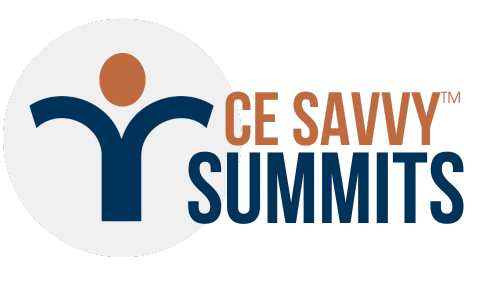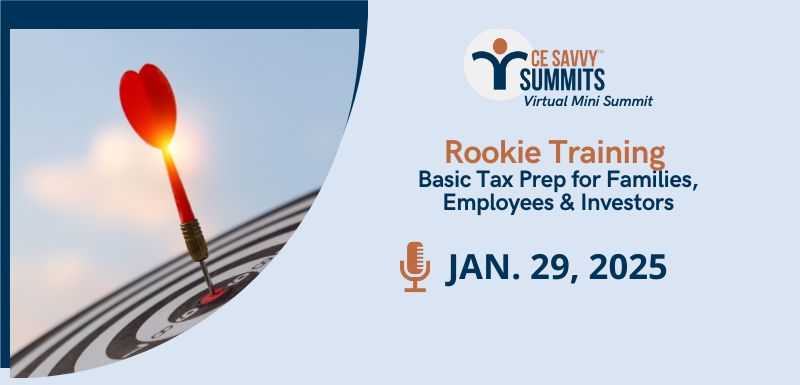Register Now for Rookie Tax School: Jan 29!

In this CE Savvy Mini Summit half day live virtual event, participants will learn how to confidently file simple tax returns at a high level. This event is part of a 4-part training series with a focus on how to file the T1 tax forms and is ideal for new, rookie tax preparers, financial advisors who interact with clients who have tax-related questions and anyone new to tax filing in Canada. As part of this training program, you are automatically enrolled in Canada’s Income Tax Fundamentals Course. Check out the agenda and register now to upskill your team before the upcoming tax season!
Click here to register!

Mark Your Calendar. Knowledge Bureau is offering 4 half day CE Savvy Summits to accommodate late form releases by CRA and help firms with continuous onboarding of new seasonal staff.
Why this is important. Filing a T1 Return and its schedules will also include the filing of over 100 little known auxiliary tax forms – some that come with filing penalties if missed. These tax form filing requirements together with tips and traps in filing them, will be covered in detail in these CE Savvy Mini Summits.
What’s Included: Each staff member will also be enrolled in Canada’s Income Tax Fundamentals Course – a 20 hour online courses that features true-to-life case studies to practice T1 filing on a choice of three professional tax software packages: TaxCycle, Profile or DT Max.
The Agenda:
|
8:15 CT
|
INTRODUCTORY COMMENTS AND VIRTUAL CAMPUS ENTRY
|
|
8:30
|
CANADA’S SELF ASSESSMENT SYSTEM AND FILING REQUIREMENTS
|
|
8:45
|
About Canada's Digital Tax System
- NETFILE and EFILE:What is the difference?
- EFILERs’ responsibilities
- RepID: Being an Authorized Representative for a client
- My Account and My Business Account
- Filing the T1 & Responding to CRA's Communications
- Tax Credits - Filing for Refundable Tax Credits
|
|
9:15
|
Reporting Income
- What is Taxable? What is Not?
- Reporting Income from Employment
- Reporting Income from Pensions
|
|
9:45
|
Introduction to Claiming Deductions
- Registered Pension Plan deduction (line 20700).
- Registered Retirement Savings Plan is (line 20800).
- First Home Savings Account (line 20805)
- What the split-pension amount is and how it works (line 21000).
- Deductions for annual union, professional like dues (line 21200).
- What qualifies as eligible Child Care Expenses (line 20400).
- What qualifies as a Disability Support Deduction (line 20500).
- Calculating moving expenses (line 21900).
- What support payments are deductible from income (line 22000).
- Eligible carrying and interest charges (line 22100).
- What is CPP for self-employed income (line 22200).
- What the CPP is for enhanced contributions on income (line 22215).
- Other employment expenses (line 22900).
- Social Benefits Repayments (line 23500).
|
|
10:30 BREAK
|
|
|
10:45
|
Introduction to Non-Refundable Tax Credits
- Basic Personal Amount
- Age Amount
- Spouse or Common-law Partner Amount
- Amount for Eligible Dependant
- Canada Caregiver Amount for Spouse or common-law partner or eligible dependant age 18 or older
- Canada Caregiver Amount other dependants age 18 or older
- Canada Caregiver Amount other dependants under age 18
- Premiums paid to CPP/QPP and EI
- Volunteer Firefights’ Amount
- Search and Rescue Volunteers’ Amount
- Canada Employment Amount
- Home Buyers’ Amount
- Home Accessibility Expenses
- Adoption Expenses
- Digital news subscription expenses
- Pension Income Amount
- Disability Amount
- Tuition Amount
- Interest on Student Loans
- Medical Amount
- Donations and Gifts
|
|
11:15
|
Reporting Income from Self-Employment
- The filing deadlines for a taxpayer who reports income from a proprietorship.
- What is the difference between employed and self employed?
- How to report income from micro-businesses in the ‘GIG’ economy, for example:
- Ride Sharing and delivery
- Home based retail services
- Consulting or other “subcontracting services
- How do you complete a basic T2125 Statement Of Business Or Professional Activities?
- How do you report the use of an asset in the business on the Capital Cost Allowance Statement?
- How are home office expenses reported?
- How Canada Pension Plan premiums are calculated and where?
- When quarterly tax instalment payments must be made?
- What happens when there is a business loss?
|
|
11:45
|
Introduction to Capital Gains Reporting
- Overview Schedule 3 – How to Calculate a Capital Gain or Loss
- Capital Gains from Information Slips
- Qualified Small Business Corporation Shares
- Qualified Farm and Fishing Property
- Publicly Traded Shares, Mutual Funds and other shares
- Real Estate, Depreciable Property and Other Properties
- Bonds, Debentures, Promissory notes
- Personal Use Property
- Listed Personal Use Property
|
|
12:15
|
Introduction to Reporting Income from Rental Properties
- Form T776 - What is reportable rental income?
- What is the difference between a co-owner and a partner for rental purposes?
- When is it necessary to report rental income?
- What are the types of expenses claimable against rental income?
- What is the difference between a repair and an improvement?
- What are the two main capital classes for reporting improvements?
- Claiming Losses - What are the rental reporting restrictions?
|
|
12:45
PRIZES AND CLOSE
|
Now Complete the online course to earn your Certificate of Achievement!
Canada’s Income Tax Fundamentals Course
|
The CE Summit Experience – here’s what attendees had to say about our January T1 Tax Update
“KB never disappoints on providing wealth of knowledge regarding tangible tax information that will benefit clients of all ages.” – Jeet Kumar
“This is always the best way to launch the upcoming tax season, the information is comprehensive and helps to shake out the cobwebs.” – Marilyn Simms
“The presenters are very knowledgeable. They covered a lot of information highlighting all of the new tax rules and changes plus the tax resources are easily accessible online for further review.” – Kareen Rekowski
“The combination of live speaker presentations, Q&A from the audience, access to the speaker's presentation to follow along and the asynchronous learning makes the CE Savvy Summits engaging.”
- Stewart
“Knowledge Bureau does a great job at bringing relevant and in-depth information together in a timely manner on what matters most in the tax industry. They over-deliver when it comes to sharing knowledge.” – Maryke Leonard-Troskie
Canada’s Income Tax Fundamentals Course – Included with Your CE Savvy Mini Summit Enrolment!
This stand alone certificate course is a recommended pre-requisite to the full DMA™ or Diploma if you have no prior tax or financial services work experience! 20 hours, 8 learning chapters, 12 true-to-life studies using professional tax software.
Curriculum
- About Canada's Digital Tax System
- What is Taxable? What is Not?
- Reporting Income from Employment, Pensions
- Claiming Deductions
- Claiming Non-Refundable and Refundable Tax Credits
- Reporting Income from Self-Employment
- Reporting Capital Gains from Investments and Properties
- Filing the T1 & Responding to CRA's Communications